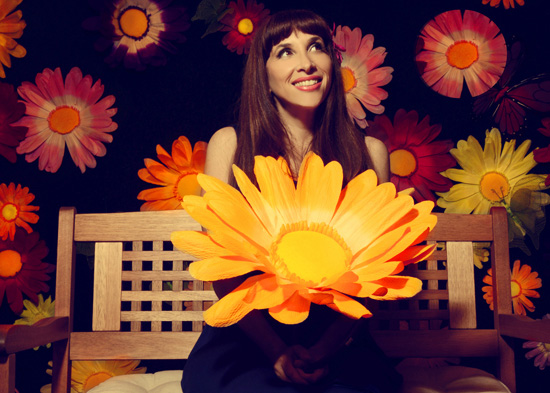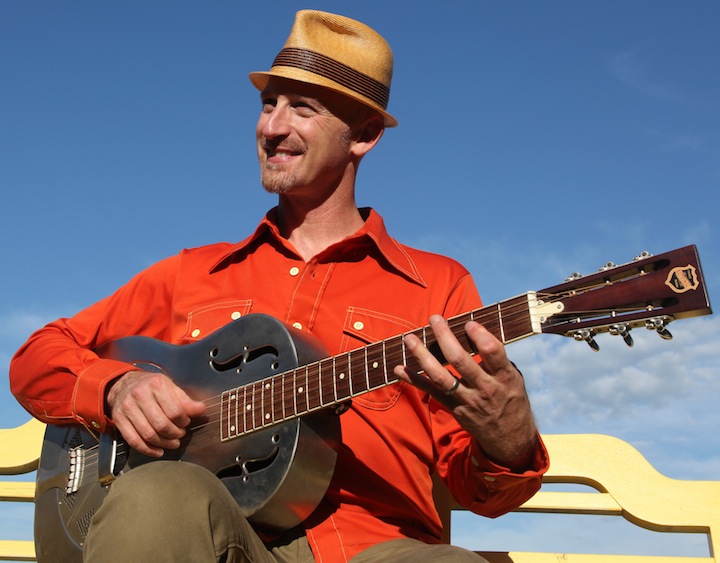The first part of my conversation with upstate New York musician Vincent Nunes had to do with his name. While Nunes has been making music for kids for about 25 years, he's had an even longer career as lawyer Paul Nunes. (Vincent is his middle name.)
Nunes has a new album about, Smart Songs for Active Children, and I was interested in talking with him not only about his music, but about living a double life, or, rather, what it's like to have an active career in the non-kids music world while pursuing a second life in an entirely different field.
Zooglobble: What are your first musical memories?
Vincent Nunes: My mother singing to me, she sang around the house -- very simple songs with Portuguese/Latin rhythm. She was 100% Portuguese. My dad was Manual Acosta… There's some reflection back -- a song on the new album, "Lullaby to Lucy," uses a kind of Portuguese melodies.
Are there Portuguese nursery rhymes?
I don't know. The songs would have the classic Portuguese rhythm. Like the "lida" [sings the rhythm] -- I used that on "My Triangle" from a previous record. Mom became a teacher. She sang from the American canon -- "Farmer in the Dell," for example.
What about your dad?
I heard him play a lot -- he was a touring musician. His main instrument was a keyboard, so we had an organ in the house. The van had a second organ. It never left the truck, it was a beast, it was so heavy to move. His band was Manny Nunes and the Latin Kicks -- they did songs with Portuguese rhythm.
Was he a vocalist?
No, not the vocalist. He sang more toward the end of his career. He was more of a lyrical interpreter -- he was a crappy singer. He was pitch perfect, but had a grizzly bear voice. He didn't sing much, for good reason.
I never took a [music] lesson from my dad. I did learn a couple rudimentary things, but nothing formal.
We lived in a 2-bedroom apartment behind my dad's jewelry store. Eventually there were 2 girls and a boy in our family, and so my sisters shared a room, and my dad had to convert the dining room into a bedroom for me. But after the remodeling, he couldn't get the upright grand piano we had in there out of the room. So I was 4 1/2 years old, and I woke up every morning staring at and squeezing past the piano getting out of bed.
What led you to the law as a career?
I never intended to be a lawyer -- I planned to be an English teacher. I took all the courses to be one. But a professor in college knew me and my family and asked, "Are you prepared for the life?" He was referring to the fact that teachers don't make much money. "You're smart, you write well -- have you thought about becoming a lawyer?"
At that point in the year, there were only 2 law schools still accepting applications, and Syracuse was one of them. I went there, and it wasn't that I liked it a lot, but I was pretty good at it, so I stayed a second year, then a third year. After graduation I worked in a U.S, District Attorney's office, I clerked for a judge, and then became a Wall Street lawyer.
And the birth of our first daughter led me out of there [to Rochester]. That was the birth of Vincent. I continued to be a lawyer, but was afraid of telling the legal community that I did kids music -- and vice versa. I was afraid that clients might not think of me as tough. I prefer smart, creative, hard-working, honest people as lawyers, but I was afraid of that perception, so I decided that "Vincent" would do kids music, and "Paul" would be the lawyer.
But I was also afraid the other way, that musicians would think, "Oh, he's a lawyer, he must not be very good, it's a vanity project." If you don't like [my music], fine, but it's not a vanity project.
It was only this year -- after years that included [my own] cancer surgery, the death of important people to me -- that I decided "this is who I am." It feels kinda good.
I'm very proud of [Smart Songs for] Active Children. I'm working on another collection now. The greatest thing is to know that something I wrote will be introduced to kids -- what an honor!
You worked on Smart Songs for Active Children for several years -- what was the organizing principle behind the album?
I asked myself, why would someone listen to kids music? There's lots of interesting and fun-to-listen-to music, but if that's the point, they can listen to the Beatles, or Pomplamoose, or Jason Mraz.
Kids are looking for protein, music that's age-appropriate. So I'm interested in music with the 3 Cs:
1) Curriculum -- the content -- for early learners. It can be even broader, including physical learning.
2) Must engage child's creativity -- can they connect to the song?
3) Does it connect to community values, such as sharing, helping, recycling, the importance of friends?
Are there any songs you're particularly proud of?
There's "No One's Going To Keep Me Down," which speaks to the concept of grit. That was a hard song to write. You can't say, "You should," it has to be declarative -- "I am." I am smart, I am strong -- what kind of strong? there's a wonderful ambiguity there -- I am brave, I tell the truth, I am kind, I can help -- extending outside yourself -- and I will not quit. That's a hard song for me to beat -- it's simple, people can phrases.
There is a very difficult song called "Manuel the Great," which has 7 different rhythms, turns on a hairpin. It was a way to expose children to different rhythms; I tried to make it silly. "They Speak Spanish" -- I didn't want to make the song "list-y." I thought about Portugal, it's the last country. I wanted to write something respectful. It started in Spain, but moved out from there.
Or "House of Love," as simple a song as can be. "What do we do in a house of love?" We dance.... the listener doesn't hear a mother/father/child triangle. What about single parents, grandparents -- I can't say mom or dad without alienating my own family. Same-sex parents -- don't they live in a house of love, too?
You have a long, successful career as a lawyer -- what do you get out of kids music?
I've thought about "legacy." You know, I've been doing law for a long time. Files will get sent back to me from cases I worked on many years ago, and I need to decide whether to save or destroy them. Looking through the files, I read about stuff I sacrificed vacations for, worked weekends on. I'll mark "destroy" usually -- if the client won't continue to pay for the storage, I'm not going to keep them.
But the little CDs I made twenty years ago, people still order them. People come and sing to me. My legacy is not my law career, but these songs.
Here's maybe a subversive thought: Music in general is part of the human psyche. We all get that rhythmic piece, that melody built right into us. Music and lyrics and super-glued to the brain. It's the first thing in the womb, and the last thing that leaves -- my dad, as he died, couldn't remember names, but could sing songs.
So if you take a children's song, infuse it with a positive message, you can change a corner of the world. "More Love" -- that's a "we can build a better world song." Numbers and colors are important, but "the rain falls, we need more love."
I have the privilege of recording the songs, which, if they're good enough, parents and teachers buy them. If they like it, then we're changing the world. If they don't like it, that's fine, there are plenty of flavors of ice cream. But if they stop at Vincent Nunes' shop, I hope they buy a double scoop.





















